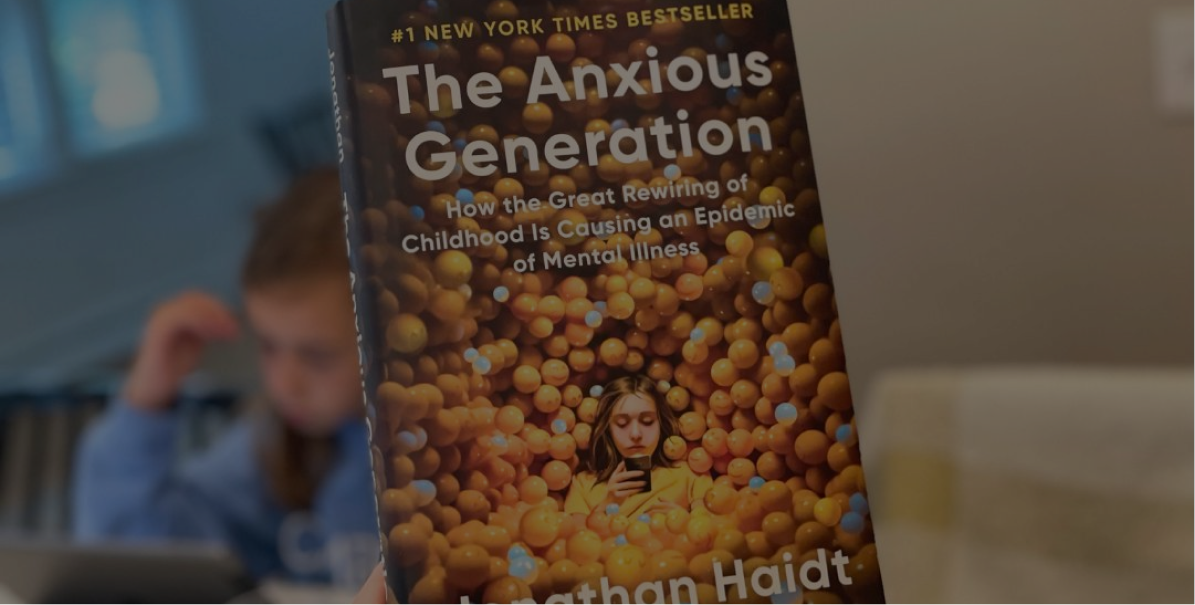Jonathan Haidt’s, 2024 book - The Anxious Generation: How the Great Rewiring of Childhood Is Causing an Epidemic of Mental Illness, jumps straight into the question that’s been shaking up many of us parents: Is our tech-first culture robbing our kids of a real childhood? As a parent trying to balance work, family and a smartphone addiction, I found Haidt’s analysis both eye-opening and alarmingly familiar.
Haidt’s thesis is straightforward yet unsettling. He argues that the digital transformation of childhood—from free, unsupervised play to a life tethered to screens, has rewired our children’s brains in ways that are causing a surge in mental health issues. According to Haidt, this “Great Rewiring” began in the early 2010s when smartphones and social media exploded onto the scene, replacing valuable face-to-face interactions and genuine play with a constant flood of easy-to-pick digital content.
One of the book’s most compelling points is its look at the trade-offs our kids are forced to make. Gone are the days when playing outdoors with friends was the norm. Instead, many children now substitute the unpredictability and messiness of real-world play with the curated, often superficial interactions online. Haidt supports his argument with a treasure trove of research and data points, although largely from USA, for instance - mental health issues like anxiety and depression have skyrocketed among adolescents since smartphones became ubiquitous. He also points out that while we, as adults, may manage to balance our digital lives with moments of offline reflection, our kids simply don’t have that luxury. I cannot agree with this point more, I see so many kids around me gravitating around the screens.
For any parent, especially dads like me who strive to be role models, the recommendations in The Anxious Generation are as practical as they are provocative. Haidt suggests a series of reforms that, if implemented, could restore balance to our children’s lives. His guidelines are refreshingly simple: delay the introduction of smartphones until high school, ban social media until at least age 16, enforce phone-free schools and—most importantly—encourage more independent, unsupervised play. The idea is not to diss technology entirely but to recognize that there’s a cost when digital interactions replace real-world experiences.
I couldn’t help but reflect on my own family habits. Like many dads, I’ve struggled with being glued to my phone, even when I know it sets a poor example for my daughter. Haidt’s call for parents to model healthy tech use resonates deeply. When we put our screens aside during family meals, playtime, or bedtime stories, we’re not just reclaiming moments for connection—we’re teaching our children how to live in a world where human interaction isn’t optional, but essential. I have put this in practice already, where I consciously set the phone aside and have a decent conversation with my daughter. No distractions, whatsoever
The book doesn’t shy away from acknowledging that technology isn’t all bad. Smartphones keep us connected in emergencies and help kids learn new things. But when they become the primary source of stimulation, our children miss out on the challenges that build resilience and character. Haidt’s message is a wake-up call: by overprotecting our kids in the real world and under-protecting them in the virtual one, we’re inadvertently setting them up for a lifetime of stress, social isolation and poor mental health.
Some might argue that the book’s alarmist tone oversimplifies the issue, noting that mental health is a multifaceted problem influenced by numerous factors, from economic pressures to global crises. I am sure that no single parameter can account for the rise in mental illness among teens, Haidt makes a persuasive case that the rapid shift to a “phone-based” childhood is a critical piece of the puzzle. His well-researched arguments push us to consider whether the convenience of digital entertainment is worth the potential cost to our kids’ emotional and social development.
The Anxious Generation offers a blend of hard data, personal insight and actionable advice that any parent can take to heart. Whether you’re a busy dad juggling deadlines and diaper changes or a concerned parent trying to find a healthy balance in an increasingly digital world, the book challenges us to rethink our relationship with technology. It’s a reminder that while our gadgets can connect us, they can also disconnect us from what truly matters: the messy, unpredictable and irreplaceable experience of a real childhood.
If you haven’t yet noticed the subtle (or not-so-subtle) signs that screen time might be taking its toll on your kids, this book might just be the catalyst you need. For those of us who have consciously decided to embrace parenting, it’s our duty to bring childhood back to earth—one offline moment at a time.



